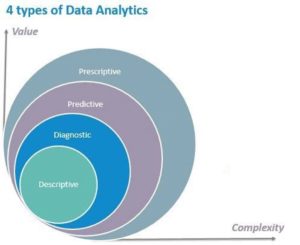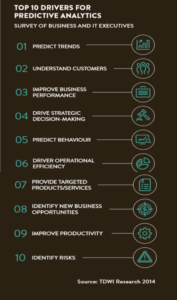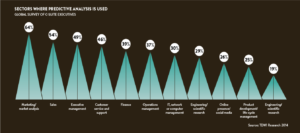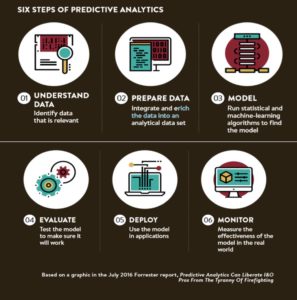Predictive Analytics are a critical tool to enable business growth. In an economy where data is the new oil – different types of analytics have different roles.
 Types of Data Analytics
Types of Data Analytics
Beginning with Descriptive Analytics – which mirror what is happening in a business by generating detailed, live, correct data. Visualisation of data is equally critical in
Predictive Analytics – to tell us what is likely to happen in a given scenario. Using past patterns from businesses to predict future outcomes using algorithms. Predictive Analytics will ensure automated outcomes and decisions using algorithms in future.
Prescriptive Analytics – which tell us what do we need to do. Where recommendations are crafted using advanced analytical techniques.
 Focus on Predictive Analytics
Focus on Predictive Analytics
The simplest definition of Predictive Analytics describes it as technology that analyses past data to predict future outcomes. The task is to use knowledge of what has happened – to deliver an assessment of what will happen in future.
Another definition describes Predictive Analytics as the 80/20 rule. We do know that 80% of our revenue comes from 20% of our prospects. Predictive Analytics helps us to identify the 20%.
Predictive Analytics will enable the business of Predictive Marketing – with automated and scientifically validated recommendations. Thus produce better business results.
Predictive Analytics for Predictive Marketing
Predictive Analytics will use data from multiple sources – both internal and external, consolidate it within a technology framework based on objectives. A customised, predictive model can be created for your business which will generate numbers and insights. You can then be in the happy space of working with that information. Because Predictive Marketing is the science and art of applying insights from Predictive Analytics across the marketing process. Be it the consumer’s path to purchase, across multiple touch points and the marketing funnel.

Predictive Analytics works across an entire Business
For a CFO – Predictive Analytics in Finance can identify trends for accurate planning, forecasting and decision making. Processes which can be improved include profitable customer segmentation, cash flow management, financial risk identification, demand planning, financial risk management, performance management.
In Manufacturing – much data is generated and stored. It is not easy to collate data from multiple sources such as engineering, quality control, production, purchasing, inventory management. It is here that Predictive Analytics uses automated discovery and analysis technologies that help manufacturers integrate enterprise data to improve operational parameters – such as ordering parts and components, optimising production schedules, managing inventory, ensuring product quality.
The Human Resource function is possibly the most vital in an organisation, from talent acquisition, to performance to productivity mapping, upskilling and even outplacement. Predcitive Analytics are bringing an element of ‘predictable, quantifiable outcomes’ to something that’s quintessentially fluid and unpredictable – human capabilities. Today’s evolved businesses are sifting through data to find the candidate that s culturally the best fit for the job and then finding ways to retain him. Predictive Analytics are also being used to enable higher levels of performance and productivity, training and upskilling employees.
 Predictive Analytics = Artificial Intelligence
Predictive Analytics = Artificial Intelligence
Traditionally associated with B2B Marketing & Sales – Predictive Analytics and its usage in B2C applications such as Siri or even self-driving cars have ensured that the B2B offering is changing to include the term ‘ Artificial Intelligence’ as its core offering. Predictive Analytics Integrated with marketing automation and CRM softwares – can deliver quantitative and qualitative insights for organisational use.
Being able to ensure collection of quality data and to be able to define objectives and a framework to deliver high level Predictive Analytics are critical for businesses to grow in our data driven and highly competitive environments. Understanding Predictive Analytics in the context of one’s business and its goals can set a business on the path to success.




